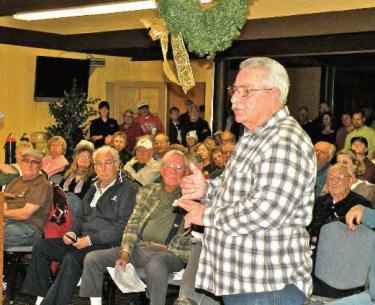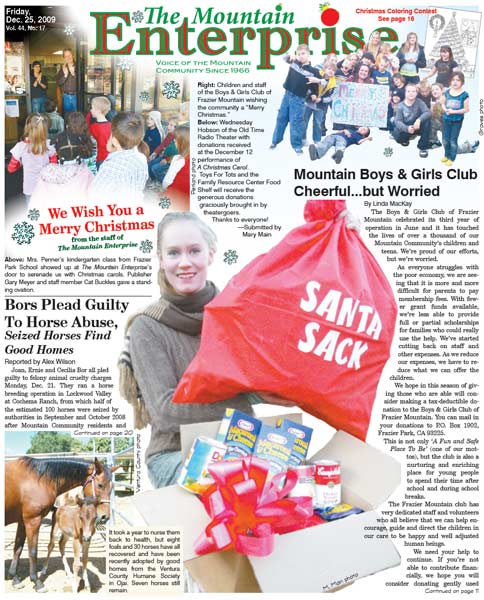
An overflow crowd gathered beneath holiday decorations in the Pine Mountain Club Condor Room for the December 19 PMCPOA Board meeting. Gary Biggerstaff said community members would conduct their own task force to look into more than security patrol issues.
By Patric Hedlund
There were festive holiday wreathes and trees bright with baubles in the Condor Room of the Pine Mountain clubhouse as about 160 members of the association filled all the seats, lined the walls and spilled out the door for the Saturday, Dec. 19 board meeting of the POA.
Many members said they hoped to tell their board of directors their concerns about retaliation and harassment against the association’s security patrol as part of a “cover-up” related to an alleged bear poaching incident.
A report in June named Lee Benavidez, who is now the chairman of the PMCPOA board of directors. The chief of the PMC security patrol filed the report with an investigator for the California Department of Fish and Game on June 12, after being told that Benavidez asked an on-duty security officer to assist him June 9 to take the body of a bear that had been hit by a truck—considered “poaching” in state law, a misdemeanor punishable by up to a year in county jail and a $10,000 fine.
The officer refused, but personnel concluded that the association could possibly have a liability because of Benavidez’ position on the board. According to the report and first-person interviews with The Mountain Enterprise, Benavidez told several people that he had taken the bear and removed its paws with a chainsaw, but he also denied it to others.
After he became board chairman in July, security officers allege that Benavidez began retaliatory measures against their department, which they allege were implemented by the general manager.
The officers’ defensive weapons (nightstick and pepper spray) were ordered removed. A task force was set up (without a written mission statement or a vote in public session by the board) to “review security’s SOPs”—the security forces’ standard operating procedures.
In two stormy public meetings December 10 and 12, officers said this “review” procedure had led to their inability to continue performing routine duties. Documents filed with the labor board say their personnel performance evaluations were allegedly “lost” and no one received a bonus or raise for the year except one male officer who had no involvement with the bear incident.
At the December 19 meeting, board member Mary Hansen suggested that board officers should consider resigning—not as directors, but as officers of the board.
“I’m going to address the issues that have been brought forth by the members. Confidence in our officers is a serious thing. I have tried in the first six months here as hard as I can, but we have failed miserably. I came on the board to see to it that we can pass our CC&Rs and I see what we have been doing as a real hindrance to doing that.” She said that “when the members do not have confidence in us” officers should resign: “Dick Welles, I am so disappointed in you, in what you have not done that needs to be done, to make sure that we have proper accounting…Jerry [Fossler], the job has not been getting done.” She said that financial records and organizational charts she had requested for months had not been made available as required by law. Member Gita Nelson also asked that the officers of the board resign. No officers volunteered to take their suggestions.
Hansen also said “I question whether we even need this patrol task force…I don’t see why [security cheif] Wastaferro can’t come before this board and work directly with this board….”
In a convoluted voting process, it was decided that the board would maintain its own investigatory task force, but expand it to include a number of members who had been critical of the task force in the public meetings.
Members Gary Biggerstaff, Kim Wickers and Bill Martin met together in a caucus outside the main meeting room, then announced that they had started their own “members’ task force.” The board agreed that Director Scott Robinson would be a liaison to that group, to make available to them data they need to fulfill their goals. In a confused series of votes, however, they also mentioned John Dilibert as a potential liaison.
At the end of the meeting, Bill Martin—who said he had decades of experience as a police officer and a private investigator— stood to say “We have been talking about…45 minutes about a committee to investigate patrol. What about the committee to investigate what has been going on with this board?” He said he would be sure that investigation takes place.
Board member Carolyn Ziegler-Davenport stated that “democracy is messy” but at least having their own CC&Rs made it possible to have these disputes locally, rather than in Bakersfield. “We have to have our own constitution here that lets us govern ourselves…whatever faults you have seen in us as individuals and as a board. I thank all of you for being here and for your input.”
This is part of the December 25, 2009 online edition of The Mountain Enterprise.
Have an opinion on this matter? We'd like to hear from you.


